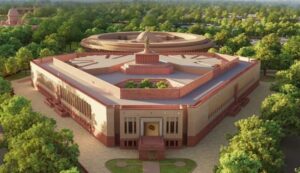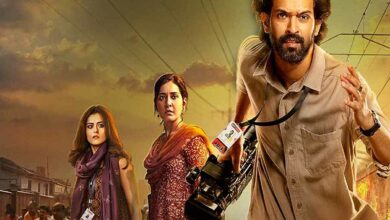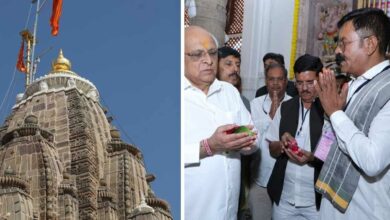BJP steps up attack on Congress over alleged links with George Soros
New Delhi: The Lok Sabha and Rajya Sabha adjourned Monday, with the opposition members claiming that the Treasury benches do not want the House to continue operating and the BJP intensifying its onslaught on the Congress over suspected ties to George Soros.

Three adjournments of the Lok Sabha were held till 12 p.m., 2 p.m., and 3 p.m. Noisy scenes persisted when the House convened at 3 p.m., and the day’s activities were adjourned.
Similar adjournments were also seen in the Rajya Sabha, when BJP legislators often brought up the accusations against the Congress, accusing its leaders of conspiring with Soros to cause instability in the nation.
The party claims that a prominent congressman, “as the co-president of the Forum of the Democratic Leaders in Asia Pacific (FDL-AP) Foundation, is linked to an organization financed by the George Soros Foundation,” and that the FDL-AP Foundation “has expressed views to treat Kashmir as a separate entity” were reiterated by Union Minister and House Leader JP Nadda.
The connection between George Soros and the Forum of Democratic Leaders in the Asia-Pacific (FDL-AP) is concerning, he added. He said that the Congress party had turned into a “tool” of those who wanted to sow discord in the nation.
Mallikarjun Kharge, the leader of the opposition, denied the accusations made against the Congress.
In an attempt to break the deadlock amid the commotion, Rajya Sabha Chairman Jagdeep Dhankhar called Nadda and Kharge to his chamber. Another meeting is scheduled on Tuesday at 10:30 a.m., he added.
According to the chairman, “It has been observed that the deep state’s functioning affects us more perniciously than COVID disease.”
“The leader of the House and the leader of the opposition met in my chamber. Making sure the House functions properly was the aim of the meeting.
After a candid conversation, both parties indicated two things. First, we hold the nation’s sovereignty and integrity in the highest regard. Our unity, integrity, and sovereignty cannot be sacrificed by any forces, either domestic or foreign. The leaders spoke candidly. They have decided to meet tomorrow at 10:30 a.m. in my room. I would urge every member of the House to give serious thought to the constitutional oath they have taken,” he stated.
“They have a very particular oath. Ensuring the integrity of the country must be their first focus. Any danger to the integrity of the country, to its unity… needs a unified challenge from all of us. Neither portion is being challenged by this. It poses a threat to our very survival. As a country, we are dedicated to combating these evil forces that are hostile to India. All of us must neutralize this system of hostile power, which is a deep state that is changing. “I would encourage the honorable members to express the opinions of the general public,” he stated.
“The general public is very worried that we must battle any elements that sow discord, undermine the idea of Bharat, and have a malevolent plan to undermine our democracy, slow our development, and obstruct our economic growth. There are 1.4 million individuals that feel the same way. “This House must be the source of that sentiment,” he said.
“This House must send a united voice to motivate the people at large, inspire the people, and defeat these forces at this critical moment when the nation is facing such serious challenges,” the Chairman said.
“This nation, which is developing quickly, cannot afford to ignore or condone such heinous plans. Instead, we should act in a way that encourages people to pay greater attention to our parliament since parliamentary discourse does not reflect the views of the general public. He predicted that the parliament would become irrelevant.
It is essential for Parliament to discuss the grave threats the country faces from groups that are determined to use a variety of tactics to overthrow it. The deep state’s operations have been seen to impact us more severely than COVID-19, and now is a time when the country as a whole has to speak with one voice. The country must provide guidance to the populace as a whole so that any adversaries of Bharat, whether within or outside, learn a valuable lesson and never attempt to undermine our integrity, our sovereignty, or obstruct our development,” he said.
Dhankhar asked both sides’ members to examine themselves.
“They must take their vows and serve as an example to the country, showing that we Indians come first and that the country comes first for us. We must be fully committed to our nationality. We will not let our sense of nationality fade. “Any challenge to our unity, integrity, and sovereignty will not be tolerated,” he said.
Following Monday’s chaos in the Rajya Sabha, Congress leader Jairam Ramesh subsequently blasted the administration, claiming that it did not want the House to operate.
Additionally, he said that Union Minister and Leader of the House JP Nadda was given “a number of chances to speak,” whereas Leader of the Opposition Mallikarjun Kharge was denied the opportunity to do so.
According to him, the opposition wants the House to run and bring up a number of concerns.
Additionally, Jairam Ramesh told ANI that the chairman called on a number of BJP MPs to speak in a selected manner.
“Today’s events in the Rajya Sabha were regrettable and unexpected. The leader of the opposition does not have a chance to speak today, but the chairman is impartial and acts as an umpire. He said that some BJP MPs were given opportunities to speak and that the House leader was given several opportunities.
“The chairman is well respected by us. He has previously held the office of governor and has spoken with concern for the problems facing farmers. However, it is unclear why he was forced to deny the Leader of the Opposition the opportunity to speak today,” Jairam Ramesh said.
The Congress MP stressed that regardless of whether the government recognizes their concerns and complaints, they would keep bringing them up.
Debates and legislation should be enacted on issues pertaining to Adani, Manipur, or the concerns of farmers. Even now, we stand by our commitment to cooperative efforts. But it has become clear in recent days that the administration does not want the House to operate,” he added.
“The government is principally in charge of running the House. We’re not avoiding the opposition’s responsibilities either.” I am wondering if these individuals will permit the Lok Sabha to discuss the Constitution on December 13 and 14 and the Rajya Sabha to do so on December 16 and 17,” he said.
The Chairman previously said that the Rajya Sabha’s strength and mission are derived from the basic values embodied in the Constitution, marking the first meeting of the Constituent Assembly of India.
“I would like to consider a significant turning point in our country’s democratic history: on this day, December 9, 1946, the Constituent Assembly of India met for the first time after its formation on December 6, 1946. The difficult job of writing the Indian Constitution, which serves as the cornerstone of our democratic Republic, began at this very moment,” he stated.
Dr. Sachchidananda Sinha, who had been a member of the Imperial Legislative Council since 1910 and the Central Legislative Assembly since 1921, presided over the Constituent Assembly’s inaugural sitting. At the time, he was the oldest member and the oldest legislator in India.
At that time, the Chairman read out three messages of congratulations from America, China, and Australia to the Constituent Assembly.
With the help of leaders like Sardar Vallabhbhai Patel, Pandit Jawaharlal Nehru, Dr. Rajendra Prasad, and Dr. BR Ambedkar, the Assembly took on the enormous work of discussing and formulating laws that would determine the course of an independent India. He said, “They did so with unwavering commitment, frequently overcoming ideological and personal differences in the spirit of nation-building.”
“The fundamental values included in that Constitution are the source of this House’s power and mission, the Rajya Sabha. As members of Parliament, it is our responsibility to preserve and defend these ideals, making sure that the goals of our predecessors are still reflected in the laws and procedures of the present day,” he said.
He said that the Constituent Assembly members’ arguments serve as a reminder of the need for productive discourse.
“Let us be motivated by the Constituent Assembly members’ commitment and vision. Their discussions serve as a reminder of the need for respectful communication and cooperation, both of which are critical to the operation of our parliamentary system,” he remarked.
“As we recall the import of this seminal moment in our history, let us also renew our pledge to serve the people of India with integrity and diligence, ever mindful of the sacrifices that made our democratic journey possible,” he said.
In order to serve as an example for legislatures around the nation, he hoped that the members would set very high standards for legislative operations and procedures.
“It is an occasion for us to commit and resolve that our actions will be exemplified, keeping in view the preamble of the Indian Constitution, and our dialogue and discourse will be attended with respect for one another in a spirit of deep understanding,” stated the chairman.





